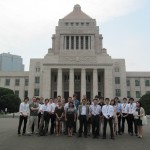The primary focus of this report is on the movement of natural persons, however the report will touch on three other issues: mutual recognition; cooperation in tourism; and cultural exceptions. These three minor issues are primarily relegated to the later portion of the report, and will likely enter our final artifact as slightly altered forms of their current manifestations in existing FTAs.
When addressing the movement of natural persons, it is important to start with the General Agreement on Trade in Services (GATS). GATS identifies four modes of trade in services: cross-border supply, consumption abroad, commercial presence, and presence of natural persons. It is the fourth mode, and only the fourth mode, which relates to actual migration. Mode 4 is defined in Article I.2 (d) of GATS as being “the supply of a service… by a service supplier of one Member, through presence of natural persons of a Member in the territory of another Member”. This definition applies to nationals as well as, in certain circumstances, permanent residents of WTO Members seeking to supply services abroad. Generally, GATS mode 4 is seen as covering three areas:
- When a foreign service supplier obtains a contract to supply services to the host country company and sends its employees to provide the services
- An individual who sells services to a host country company or to an individual
- Persons who are employed abroad by foreign companies established in the host country.
Mode 4 service suppliers can be differentiated from other migratory labor as these suppliers: gain entry for a specific purpose, are normally confined to one sector, and are temporary. Most countries, however, including Japan and Canada have only made horizontal commitments (as outlined in the table on page 5, under status quo).
While GATS commitments apply to all WTO members, FTAs/EPAs can include sections that expand on the movement of natural persons in order to create a special bilateral relationship between countries which would not be possible on a multilateral basis. Expansion typically takes to form of an extended list of professions which qualify for trade. In most agreements, labour mobility does not override general migration legislation. Exceptions are made for national security, public health and safety, and the protection of the domestic labor force. Hence, parties retain broad discretion to grant, refuse, and administer residence permits and visas. Many agreements exclude certain service sectors from coverage or apply special rules to certain sectors. Many agreements, foremost among them the North American Free Trade Agreement (NAFTA), are no longer limited to trade in services, but group intra-corporate transferees, service suppliers, and investors together in a separate chapter on the general movement of natural persons.
When dealing specifically with Japan and Canada, the WTO has isolated several key migration issues. Japan’s shrinking labor force should result in the country easing restrictions on the migration of foreign workers, however to date, this has not been a priority of the Japanese government. To date, most Japanese EPAs cover the movement of natural persons to some degree. In Canada however, immigration is difficult to address in FTAs because Canadian immigration regulations and the issuance and enforcement of licenses fall under both federal and provincial jurisdiction. Because FTAs are negotiated between federal governments, Canada often has its hands tied when dealing with immigration issues. The joint study by Canada and Japan identified several areas in which the Japanese would like to see improvements. In general, Japanese businesspeople would like visa issuance procedures to be simplified and the validity periods to be extended. They would also like greater transparency and clarification on the visa issuance procedures for skilled workers and tourism workers. The joint study does not identify any desire from the Canadian side with regard to migration issues.


